
Free Self Esteem Activities to Powerfully Fuel Your Baby, Toddler, and Older Child for Life
• Help your child build high self esteem with simple self esteem activities - it's the greatest gift you can offer your child!
• With these really powerful free exercises you can:
- Fill your baby's backpack for life with positive self esteem:
- see intuitive self esteem exercises for babies - Make your toddler feel heard and respected:
- see toddler self esteem exercises of full acceptance - Prepare your child for healthy independence:
- see supportive self esteem exercises for older children
No Need to Wait!
You Can Start the Minute Your Child Is Born
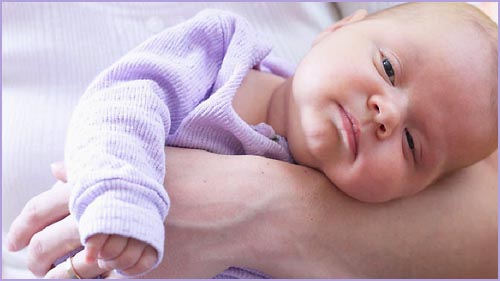
It is never too early to start building high self esteem in your child. In fact, the earlier the better!
Without being aware of it, you've probably already been doing powerful self esteem activities with your baby shortly after he or she was born.
You've been doing close bonding, providing deep presence, meeting your baby's needs on many levels.
Even though these self esteem exercises of bonding and 'tuning in' to your child may seem rather intangible, such self esteem exercises are in fact some of the most important and powerful early self esteem building blocks you can help your child lay as a solid preparation and foundation for life.
You see, self esteem activities are not just 'doings' - like for instance writing down positive affirmations with your kid or talking constructively about your kid's self image.
No, self esteem exercises may also be a lot more basic.
This goes especially with infants and very young children who haven't yet mastered the language or abstract mental capacities to such a degree that they can use them as concrete self esteem tools.
Self Esteem Activities Tailor-made for Your Child's Age
- For Babies, Toddlers and Older Kids
In this article I will present you with powerful self esteem exercises tailored to your child as he or she climbs up the age ladder.
What you will notice about the self esteem activities is that the younger your child is, the more intuitive the self esteem exercises will be by nature and the more you will be 'leading' them.
And the other way around, the older your child is, the more you will function as a guide: You're there by your child with your presence and support while your child is trying to understand himself / herself and the world.
(If you want to learn more about yourself, you can take this
Enneagram
quiz for self esteem. This quiz for self esteem will not only reveal your
Enneagram personality type and you low self esteem soft spot, it will also give you unique practical parenting advice to build high self esteem in your child.)
Make Your Child Healthily Dependent First ... Then Healthy Independence is the Natural Next Step
With infants and babies we're not aiming at strengthening their sense of independence as such (even though it's a positive by-product) - we're aiming more at strengthening intimacy and closeness.
The reason for this is that before you child can enter the world equipped with strong independence, he or she needs to have been healthily dependent first.
Your child needs to feel safe and secure in your presence in order to want to fully explore the world.
No matter how old your child is:
- Fully accepting and loving who your child is (also when he or she is angry or misbehaving) helps your child to accept and love who he or she is!
This means that the intuitive self esteem exercises you do with your baby - or the activities of accepting and respecting your toddler - are not put aside as your child grows older.
It's still very important to practice basic intuitive self esteem activities with your older child - such as holding your kid, being present and having deep eye contact.
But the point is that, as your child grows, you can ad more reflective and linguistic activities to the intuitive ones.
In other words you still keep practicing many of the 'old' self esteem activities while adding new ones well-suited to your child's stage of development.
All right then, let's get down to business!
Self Esteem Exercises for You and Your Baby
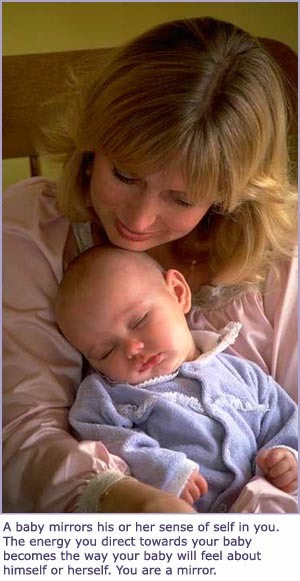
Yes, you can already start building self esteem in your child from the moment he or she is born. Isn't that great!
What you will notice about the self esteem activities for babies is that they are very intuitive by nature.
Probably you are already pouring lots of positive self esteem into your child.
What you will be doing is basically unlimited giving in terms of attention, presence, food, comfort etc.
Your baby is all new to this world and is slowly starting to develop his or her sense of self. And the way your child feels and understands himself or herself ... is through YOU!
Yes, you are a mirror. And because your baby doesn't have a sense of self yet, most of what he or she feels is coming through you.
When your baby looks at you and you give your baby full attention back, your baby will get to feel himself or herself through that 'union' or that 'merging' with you.
Below is a list of self esteem activities you can engage in to make that important mirror experience a good one for you and your baby:
1) Quickly Picking up and Comforting Your Baby!
When you quickly pick up your crying baby or breastfeed your baby as soon as you see an early sign of hunger, your baby will start to develop what is called secure attachment.Secure attachment is another word for healthy dependence. When you quickly and consistently comfort, feed, talk to, touch and look at your child, your baby starts to build confidence in you and rely on you: "I can trust Mom (or Dad)!"
When your child builds trust in you as a strong and reliable caregiver, you install a basic sense of security in your baby: "I'm safe and whole with Mom (or Dad)!"
Your positive attention will literally rub off and affect your baby's self image: "Mom and Dad see me, hear me and understand me ... I must be important!"
2) Lots of Carrying, Holding, Kissing, Skin-to-Skin etc.
- Plenty and
Plenty of Physical Contact.

A baby's sense of self is developed through his or her contact with you.
When you hold and touch your baby, it's a direct way for your baby's to feel himself or herself.
When your baby is brought into this world, he or she may often feel lost and 'limitless' without physical contact (this is particularly true of high need babies).
In a way your physical contact is your baby's anchor in this new world.
To provide your baby with this close access to you, you may consider buying a baby sling or babywearer - it worked like a dream for me and my son.
3) Deep Eye Contact with Your Baby
You are your baby's mirror. When your child looks at you and senses your positive, deep attention, your baby sees himself of herself in that very same positive light.This positive mirror effect plants that fertile seed of wonderful high self esteem in your child - easily and effectively!
Obvious places to engage in these valuable eye contact self esteem activities with your baby are:
- On the baby changing table.
- In the baby bath.
- When you sit down with your baby and turn him or her to face you.
- Lying down on the floor or in your bed.
4) Talking to Your Baby in a Positive Tone of Voice
Just like touch works like an anchor for your baby to this world, so does your voice. When you talk, it simply helps your baby feel secure and 'at home'. Your voice works like an invisible safety line.Also, your baby may not understand what you're saying but your baby does sense your energy and your tone of voice.
There are many situations in which you can positively benefit from the power of your voice, for instance:
- Keep talking to your baby to establish a sense of connection if for some reason you can't immediately attend to your baby's needs (e.g. you need to attend to something in the kitchen while your baby is in another room).
- Talk to your child while breastfeeding, changing diapers, bathing etc.
- Try to keep a positive attitude and a gentle tone voice even when irritated. For instance, it's now the fifth time the same night that your baby wants you. But from your baby's perspective 'now' is all there is and he or she is craving you and what you can give - whether that is food or comfort.
- Singing is also a great way to connect with your baby.
5) Make Your Baby Reach out for His or Her Toys
and Succeed
When your baby is about 4-6 months old, you may ad some beginner's athletics self esteem activities to the intuitive bonding self esteem activities.
Some of the first attempts of conscious physical exercises your baby will engage in will be those of reaching out for something, for instance your face or toys.
When your baby reaches out for something that is a bit challenging - a bit out of reach - and succeeds, it ads a little boost of that important "I can" to your child's inner self esteem container!
Activities for You and Your Toddler
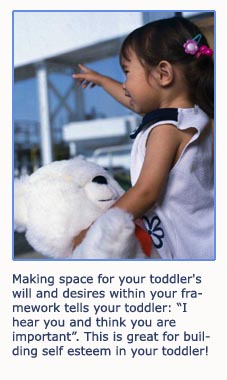 When building high self esteem in your toddler, you're still fuelling him or her with lots of physical bonding and presence just like when he or she was a baby. The intuitive baby self esteem activities are so powerful that they can be applied positively at any age and stage of child development!
When building high self esteem in your toddler, you're still fuelling him or her with lots of physical bonding and presence just like when he or she was a baby. The intuitive baby self esteem activities are so powerful that they can be applied positively at any age and stage of child development!
What is different now is that your toddler is also starting to become more self-aware and can express his or her desires more easily.
Positive parenting is a parenting style that puts an emphasis on respecting your child as a 'real' person, an equal, who needs to be listened to and to have some degree of say ... just like us adults.
1) Let Your Child Make Decisions Within Your Firm Framework
Kids need limits - a well-defined framework with certain rules - to feel secure but you can make space for your toddler's decisions inside of your framework. Allowing your child space to exercise his will is an extremely good way to build self esteem in your child:For instance:
- If it's cold outside and your child needs to wear a sweater, let your toddler choose which one out of 2-3 options.
- Make sure everything you put on the table at dinner is healthy so that you child can feel empowered by choosing what to eat (for instance I only make blended vegetable sauces so that if my son only feels like sauce, he can have as much as he pleases that particular evening).
- If your toddler is so dirty that a bath is absolutely imperative that evening, let your toddler choose which (water resistant) toys that he or she may play with in the tub.
2) Accept Your Toddler's Tantrums
- Let Him or Her Know
That It's Okay to Be Angry or Sad
When your toddler throws a tantrum, the power in it may be so strong that you may almost feel scared or helpless.
But no need to worry, a tantrum just consists of emotions gone a bit wild. Emotions are still very difficult for your child to handle so they just come out very 'raw'.
So again, be a solid anchor for your child and stay calm. Be near your toddler and let him or her know that you're there when he or she needs it.
I my case, I have often just sat down and waited patiently until my son was 'ready' for my approach. Until I could feel the worst of the storm was over and he needed to bond! In this way I would wait until the 'explosion' was over and then reunite!
This 'staying present' and accepting will tell your toddler: "I love you no matter how you feel (or behave) - and you don't need to hold back on expressing fear or anger - tough emotions are okay!"
3) Talk with Your Toddler - not Only to Your Toddler
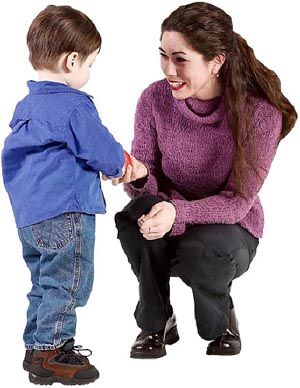
Having conversations with your toddler, listening closely to his or her words, paying attention, and responding respectfully tells your toddler that you view him or her as an important person.
And this will be the way that your toddler will also feel about himself or herself.
4) Encourage Your Toddler
For instance your toddler comes over and tells you that he or she has peed in his or her pants.Instead of focusing on the 'failure' saying "Oh no, you're all wet, you should have told me that you wanted to pee" you can choose to focus constructively on what your child actually did achieve: "Yes, I can feel your pants are wet, I'm really glad you told me. That was big of you. Let's change your pants so that you can be ready for the potty next time around".
5) Make Your Toddler a Partner in What Are Your Decisions
When I have to really do something that is important for some reason I try to make my son feel an active partner in the decision making process.For instance: "You know what? Mom has forgotten to buy milk. It would be really great if you could help Mom go down and buy it because we don't want to be without milk, do we? Let's do this together and you can show Mom the way there!"
By engaging and involving your toddler in the project of your decision, you will make your toddler feel 'big' and important. Like an equal partner. This 'making a decision together' (even though the decision is yours) may be really helpful if you have a child with a strong will. Rather than breaking the strong will (which is a great asset) - get it on your side!
6) Prepare Your Toddler's Consciousness for Changes
Well Ahead of Time.
By telling your toddler and including him or her in what will happen soon (even if it is not pleasant), you provide your child with a sense of control of what is going to happen.
When your toddler's consciousness is prepared for a certain event, it may still hurt when it happens (for instance if you need to leave for work) but your toddler will still feel more secure because he or she knew it would happen.
7) Explain Your "No's".
When you explain why you have 'said no' to something or why you make the decision that you do, your toddler feels respected and seen - even if it denies him or her something like for instance running in the streets.When my toddler asks me for something, and I have to say 'no', I always strive to provide him with a full explanation well aware that he probably doesn't understand half of it.
But it's not the explanation in itself that matters, it's the intention!
What my toddler does understand is that I find him worthy of an explanation, that I actually bother!
Including your child in 'why' is simply showing respect!
8) Reasonable Expectations
- Look for the Window of Opportunity.
When your toddler wants to do something that might be a tad difficult but he or she still manages to succeed - your toddler will feel great about himself or herself. It really builds self esteem in terms of "I can".
You can initiate games that challenge your toddler but that are still 'doable':
- Build tall towers with toy bricks!
- Make animals in plasticine and let your toddler put on the final touch!
- Read a story out loud and let your toddler comment on the pictures!
9) Let Your Toddler Participate in Chores
When you do chores that seem important to you - your child will probably want to be part of that too. Your child would like to be part of that space of attention and importance. Doing something that seems important to you is great for building self esteem in your child.To include your toddler you can:
- Let your toddler help you set the table for dinner, entrusting him or her with carrying things that aren't dangerous.
- Even though it may take for ever, let your toddler help you hold the vacuum cleaner until he or she gets bored enough to do something else.
- Let your toddler help you with the cooking - for instance putting things in pots and pans.
- Give your toddler his or her very own cloth so that he or she can help you clean safe surfaces.
- Let your toddler carry his or her own clothes to the washing machine and press start when ready.
- Let your toddler tell you which clothes belongs to whom when putting them away after a wash.
10) Let Your Toddler Learn the Consequences
of His or
Her Actions
When your child is throwing things around in anger, you may want to try to focus your attention on the unfortunate consequences of your toddler's actions rather than becoming angry with your toddler for misbehaving.
For instance, you may tell your toddler: "It makes Mom sad that you broke this plate because now it doesn't work anymore and Mom has to throw it out" or "You see how the wheels have fallen off your car because you threw it. Toys may break when you throw them around".
When you direct your attention to your toddler's actions (the consequences) rather than on him as a person (Saying "you're a bad boy") you leave his or her self esteem intact while still teaching your child how to behave in this world.
Self Esteem Activities for You and Your Child
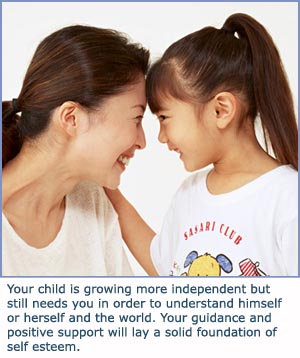
Your child can now do more and more and by himself or herself and is gradually growing more and more independent. However, your child still needs you very much.
You are still an anchor of security in a ever challenging world. You have been given the important role as a guide to help your child understand inner life as well as outer life.
1) Listen to Your Child to Get to Know His or Her Real Interests
Support your child in what interests him or her. What we think is fun is often also what we're good at.
2) Help Your Child Learn the Skill of Decision Making
Talk with your child and help your child learn the tool of brainstorming options and possibilities. This will empower your child to see another perspective and view things from above.3) Help Your Child Express His or Her Feelings
Talk with your child if you sense he or she is upset. This will help your child understand himself / herself better and not to be afraid of his or her own emotions. As we all know, emotions can seem very confusing.Encouraging your child to share emotions also teaches your kid not be afraid to come to you for support and help.
4) Turn Your Child's Self Criticism Around
Be quick to spot when your child is putting himself or herself down: "I'm not good at this or that".Support your child by praising his or her effort and persistence rather than judging whether it was well done or not.
5) Make Your Child Share Himself or Herself with You
- Ask Open-Ended
Questions

Make your child share his or her day with you, ask how your child experienced a certain event or ask your child about his or her opinion about something.
This sharing will make your child feel important, equal and valuable: "I matter!"
6) Protect Your Child from Obvious Failures
- Set Realistic Goals
A child should of course challenge himself / herself. This is part of growing up and acquiring and fine tuning new skills.
But is also necessary for your child's sense of self esteem to succeed when lots of effort has been made.
Therefore help your child set realistic goals. Rather than encouraging your child's wish to become the best football player in the country - emphasize how well he does on his own terms, his technique, persistence, ability to run etc.
7) Laugh at Yourself - Set an Example of Self Ridicule
By laughing at yourself, you teach your child not to take himself or herself too seriously. This ability not to be too attached to an outward image makes life a lot easier. You teach your child to be less susceptible to outward pressure and potential ridicule.8) Don't
Hold Back on Hugs and Kisses as Rewards
- Use Them Spontaneously!
Surprise your child with affection when he or she doesn't expect it. Don't save those affections up for when your child is 'being good'.
Spontaneously paying positive attention to your child teaches your child that your respect and attention are always there no matter what - they're not something your child needs to earn!
If you have any great self esteem activities or a powerful self esteem story you want to share with other parents, please don't hold yourself back. Go here to read and share self esteem stories about children.
Your Positive Parenting Ally,
Birgitte

Want to stay in touch and get the latest news?
Sign up
for my free newsletter
Parent Coaching
- For Inner Peace, Clarity and a Deeper Connection to Your Child
 Being a parent can feel like a double-edged sword. Life with kids may feel like the greatest gift you have ever received, while at the same being hugely challenging, often leaving you confused, stressed and overwhelmed.
Being a parent can feel like a double-edged sword. Life with kids may feel like the greatest gift you have ever received, while at the same being hugely challenging, often leaving you confused, stressed and overwhelmed.
When we feel like this, we've lost touch with ourselves. We can't hear our own inner voice, and it's difficult to know what is 'right' for us and how to act.
I offer in-depth parent coaching to help you regain your balance and get back in touch with yourself. From a place of inner peace and clarity, your will find your own answers which will help you reconnect with your child from a place of unconditional love and acceptance.
Read more about my parent coaching here.
Where Would You Like to Go Next?
 High Self Esteem Children Make a Real Difference with Your Presence and Discover the Power of Unconditional Support. |
 Quiz for Self Esteem: Find Your Enneagram Personality Type and Get Tailor Suited Parenting Advice to Build High Self Esteem Children. |
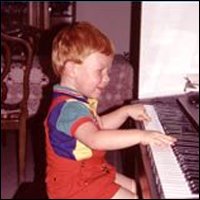 Children Self Esteem Stories: Empower yourself and others by reading and sharing a self esteem uplifting story. |
 Who Are Parents' Favorite Superheroes? Their Children Of Course!: Expert guest post about empathy in children by Laurie Hollman Ph.D. |
Back to the top of this page about Free Self Esteem Activities to Powerfully Fuel Your Baby, Toddler, and Older Child for Life
Go to the Positive Parenting Ally Homepage







